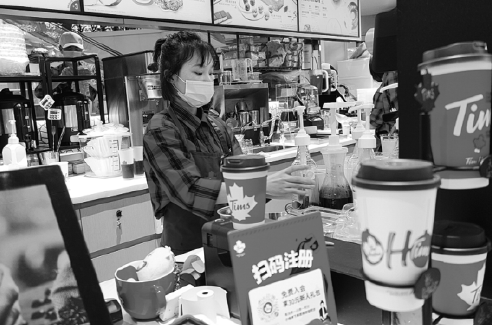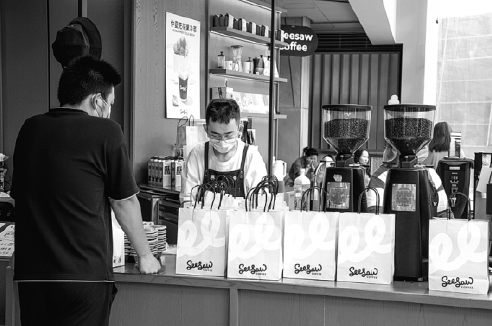Roasted coffee stirs investments and generates aroma of big profits

It is not just hot beverage lovers who are getting swayed by the irresistible aroma of roasted coffee in China. Venture capital firms are sensing in the aroma a whiff of steady big profits-the kind that coffeehouse chains have been raking in for a while now, raising prospects for solid growth.
What is also stoking interest in the market are deals like the one the Chinese unit of Tim Hortons, the iconic Canadian coffeehouse chain, agreed in August to go public through a merger with Silver Crest Acquisition Corp, a blank check company, according to newswire Bloomberg.
The transaction will give Tim Hortons China a Nasdaq listing and value the business at about $1.69 billion, including debt, according to Silver Crest. The deal is expected to close in the fourth quarter of this year.
Tim Hortons China is a joint venture between Restaurant Brands International Inc and private equity firm Cartesian Capital Group. Other investors include Sequoia Capital China and Chinese internet giant Tencent Holdings Ltd.
Tims China is Cartesian's second restaurant investment in China. Cartesian is also a major shareholder in BurgerKing China, which has grown from a 56-restaurant chain to one with over 1,300 restaurants.
Peter Yu, a managing partner and co-founder of Cartesian Capital and chairman of Tims China, said the firm is going to build a chain of 2,750 coffee-brewing and baking stores. In the first quarter of this year, Tims China has achieved a same-store revenue growth of more than 40 percent year-on-year.
"We plan to grow to a revenue of more than 7 billion yuan ($1.08 billion) by 2026, and a profit rate of more than 19 percent," he said.
Tims China has estimated the revenue of its directly owned stores to reach 671 million yuan, which means its average aggregated annual growth rate will likely rise to 63 percent.
Lu Yongchen, CEO of Tims China, said the firm is aiming to expand its network in China to 400 stores, including its flagship stores, standard stores and Tims Go, which is designed mainly for delivery services.
Meanwhile, China's tech giant ByteDance has backed coffeehouse chain Manner Coffee, a boutique coffee chain in China, which is known for cost-effective deals and minimalist sleek design of its shops. On May 24, Manner received hundreds of millions of dollars in strategic funding from Dragon Ball Capital, a subsidiary of Meituan Dianping. After this round of investment, Manner Coffee was valued at about $1.3 billion.
On July 23, Shanghai-based coffeehouse chain M Stand completed a funding round of more than 500 million yuan, led by BA Capital and Bridge Capital.
Existing investor CMC Capital also took part in the funding, pushing M Stand's market value to about 4 billion yuan.
The coffeehouse chain said the new fund will be used to build a talented team, strengthen its supply chain, upgrade its intelligent information and digital platforms, and expand its network.
M Stand will continue to upscale its stores in other cities, including Suzhou and Nanjing in Jiangsu province, Wuhan in Hubei province and Chengdu in Sichuan province, to reach its goal of exceeding 100 stores by this year.
In July, Seesaw Coffee, a specialty coffee roaster and retailer, which currently has 33 stores, also received an investment of 100 million yuan from Chinese boutique teahouse chain HeyTea, China's leading milk tea chain, to open new stores. The move represents HeyTea's first play in the coffee category. The milk tea company now has more than 200 retail locations.
The new investment in Seesaw will be used to enhance its supply chain and optimize its digital tools. In August, Seesaw, which was founded in 2012, opened seven stores in four cities. Among them, the first Good Idea Hub was opened in Shanghai, offering coffee during daytime and alcoholic drinks at nighttime. The brand aims to triple its current store number by this year-end.
International coffeehouse operators are attuned to the emerging business opportunities in the country. They are keen to open their first store or upgrade their existing footprints.
Blue Bottle Coffee, a coffeehouse chain from the Nestle stable, is reportedly planning to open its first store in Shanghai this year.
Starbucks China had 5,135 stores by the end of June, having recovered the pre-pandemic-level full speed of opening new outlets.
McCafe, the in-house coffee service of US fast food chain McDonald's, said it would invest 2.5 billion yuan over the next three years to accelerate expansion and penetration in the Chinese mainland market by adding new shops, boosting deliveries and diversifying snack offerings.
The global brand is planning to have more than 4,000 McCafe outlets across the country by 2023. Till date, the company has more than 1,600 stores.
According to a report from research firm Mintel on the on-premise coffee sector, the overall number of coffeehouses in China has continued to rise, with strong momentum to recover from the impact of the COVID-19 pandemic.
In the future, the on-premise coffee sector is expected to reach 190,000 stores by 2025, with an average annual growth rate of 11.9 percent in the next three years.


Today's Top News
- Foreign ministers of China, Egypt call for Gaza progress
- Shield machine achieves Yangtze tunnel milestone
- Expanding domestic demand a strategic move to sustain high-quality development
- Xi hears report from Macao SAR chief executive
- Xi hears report from HKSAR chief executive
- UN envoy calls on Japan to retract Taiwan comments






























